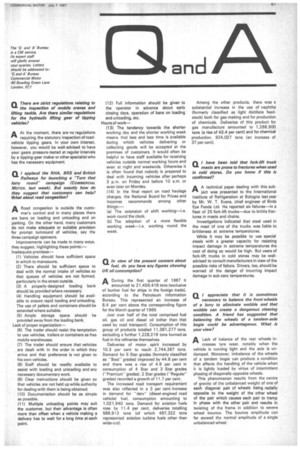Q I applaud the RHA, BRS and British
Page 89

If you've noticed an error in this article please click here to report it so we can fix it.
Railways for launching a "Turn that lorry round" campaign (COMMERCIAL MOTOR, last week). But exactly how do they suggest that customers can help? What about road congestion?
ARoad congestion is outside the custo
mer's control and in many places there are bans on loading and unloading and on parking. On the other hand, many customers do not make adequate or suitable provision for prompt turnround of vehicles, say the three campaign sponsors.
Improvements can be made in many ways, they suggest, highlighting these points:— Inadequate premises 1 Vehicles should have sufficient space in which to manoeuvre.
(2) There should be sufficient space to deal with the normal intake of vehicles so that queues of vehicles are not formed, particularly in the street outside.
(3) A properly-designed loading bank should be provided where necessary.
(4) Handling equipment should be available to ensure rapid loading and unloading. The use of pallets and containers should be extended where suitable.
(5) Ample storage space should be provided away from the loading bank. Lack of proper organization—
(6) The trader should resist the temptation to use vehicles, trailers or containers as free mobile warehouses.
(7) The trader should ensure that vehicles are dealt with in the order in which they arrive and that preference is not given to his own vehicles.
181 Staff should be readily available to assist with loading and unloading and any necessary documentary work.
(9) Clear instructions should be given so that vehicles are not held up while authority for dealing with them is being obtained.
(10) Documentation should be as simple as possible.
(11) Multiple unloading points may suit the customer, but their advantage is often more than offset when a vehicle making a delivery has to wait for a long time at each point. (12) Full information should be given to the operator in advance about early closing days, operation of bans on loading and unloading, etc.
Hours of work—
(13) The tendency towards the shorter working day and the shorter working week means that less and less time is available during which vehicles delivering or collecting goods will be accepted at the premises of customers. It would often be helpful to have staff available for receiving vehicles outside normal working hours and even at night and weekends. Otherwise it is often found that nobody is prepared to deal with incoming vehicles after perhaps 3 p.m. on Friday and before 10 a.m. or even later on Monday.
(14) In the final report on road haulage charges, the National Board for Prices and Incomes recommends among other things:—
(a) The extension of shift working—i.e. work round the clock.
(b) The adoption of a more flexible working week—i.e. working round the week.




































































































































